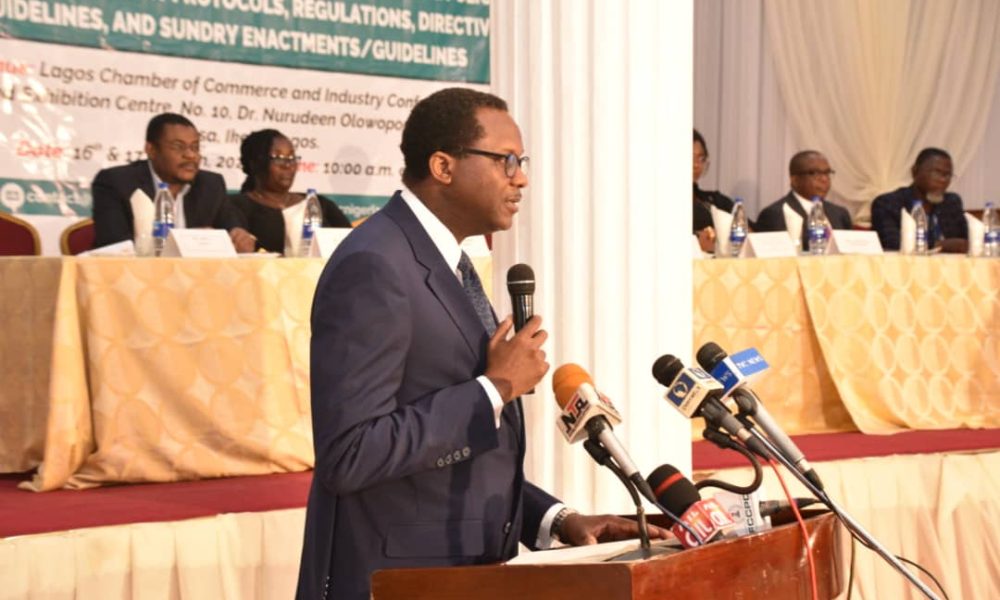The chief executive officer of the federal competition & consumer protection council (FCCPC) Babatunde Irukera has said that, sustainable consumption should be a matter of urgency and priority for Nigeria. Professional bodies, regulatory agencies, among others must come together and ensure sustainable consumption becomes a reality. He added
Irueka made this known yesterday in Lagos during a stakeholders meeting to Commemorate this year’s world consumer rights day with the theme:
“Attaining sustaining consumption in Nigeria”
Sustainable consumption according to him, is the use of goods and services in a way that minimizes negative impact on the environment, for the benefit of present and future generations. Essentially, it involves preference for materials that can be reused and recycled to avoid wastage and harm to the environment.
He pointed out that, the conversation on sustainable environment is not new; it received attention in 1992 at the United Nations’ Conference on Environment and Development, where it was decided that non-commitment to sustainable consumption was a major cause of environmental degradation globally, and has led to poverty and environmental imbalances.
“incidentally, sustainable consumption is a multi-stakeholder task. Government, business operators as well as consumers must join hands to positively change the narrative to one that will not only safeguard the environment, but also enhance the welfare of consumers. He added.
Continuing, he disclosed that, consumers have a right to sustainable environment, and government, businesses and consumers play a vital role in ensuring the environment is sustained. Informed and assertive consumers can ensure their habits do not affect the rights of others to sustainable environment.
the world in the past three weeks has changed the more. Countries are shutting down their borders, countries are suspending schools, religious activities, among other social functions. As we speak today, the United States of America is considering a national shut down by tomorrow. This, is not restricted to US alone, as other countries are also under locked down.” He said.
For him, what started as an isolated issue in one district in China, has become the world number one public enemy three months after. In Nigeria, what we considered alien to us few weeks ago has become an emergency to us. But, that should not make us panic, we should learn from what other countries did not do well and and effect those correction.
Further, he disclosed that, sustainable environment is not about what happened in other countries but a collective efforts of citizens of a given country to make their country a better place. So, if we decide to fold our hands and watch things go out of hand, we will have ourselves to be blamed. As a matter of fact, we in Africa are more vulnerable than any other part of the world. If northern Italy who has the best health care system in the whole of Europe is finding it difficult to curtail conronavirus today, I wonder what will become of Africa if we are hit by the virus like Italy.
He stated that, waste disposal or waste management is a problem in most cities of the world. It is said that, a plastic will take four hundred and fifty years to five hundred years to decompose. What that means is, the waste we are seeing now will outlive all of us. I have heard people talk about the fact that, they don’t want to borrow so as not to live a burden for their unborn generation. But, I make bold to say that sustainable consumption is a larger burden to our unborn generation than debt.
Consequent upon the benefits derivable from sustainable consumption, the Commission, packaged food-drinks, water and container producing companies and other stakeholders adopted the following principles considered vital for sustainability and protection of Nigerian Consumers, as relevant business guidance directive:
Consumer Education:
Encourage Consumers to recycle;
Encourage Consumers to purchase recyclable products;
Encourage the Farm to Fork principle.
The meeting also resolved that parties commit to a broad-based stakeholder engagement to further promote and develop these principles, Business Guidance and regulatory framework.
Parties recognize the urgency required and as such agree that the engagement and guidance development process must occur and conclude shortly and timely.







